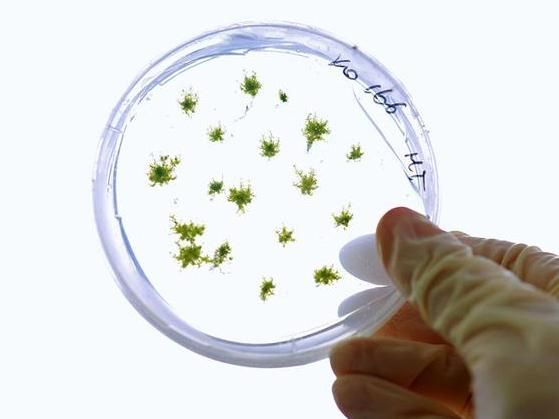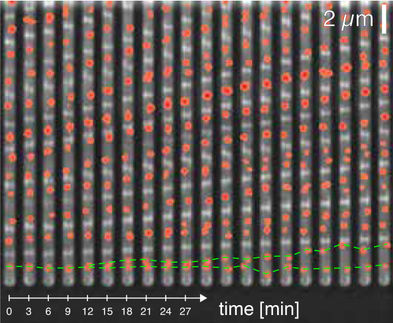How to target a gene
Finding proteins important for plant development, DNA repair and gene targeting
All living cells have invented mechanisms to protect their DNA against breaks during duplication and against damage by UV-light or chemicals. A team of biologists led by Prof. Dr. Ralf Reski from the Faculty of Biology of the University of Freiburg, Germany has now found that members of the RecQ family function in development, DNA repair and gene targeting in the moss Physcomitrella patens. Their results may hold the key to a precise engineering of plant genomes including crop plants. The Julius-Kuehn-Institute, the German Federal Research Centre for Cultivated Plants in Quedlinburg and the INRA Centre de Versailles-Grignon, France contributed to the study.

Moss plants on a Petri dish.
Sigrid Gombert
RecQ proteins can be found in bacteria, fungi, animals and plants. Their function is best investigated in humans, because mutations in these genes lead to disease syndromes like Bloom, Werner or Rothmund-Thomson or to cancer. Their function in plants was less well understood. The team now found that the two model species predominantly analyzed for DNA recombination, the flowering plant Arabidopsis thaliana and the moss Physcomitrella patens, differ specifically in their RecQ4 and RecQ6 genes. Engineering different transgenic plants, the scientists found that RecQ4 is important for normal moss development and for DNA repair, whereas RecQ6, which does not exist in Arabidopsis, strongly enhances gene targeting.
Gene targeting in moss was first published by Reski’s group in 1998 and since then was used to answer many fundamental questions in biology. Moreover, this method was used extensively in biotechnology to create and to exploit knock-out mosses.
“Ever since we published the first knock-out mosses 20 years ago, I was curious to understand why Physcomitrella is orders of magnitude more efficient in gene targeting than any other plant”, explains Reski. Several groups world-wide tried to answer this conundrum, albeit in vain. Teaming up with the experts in Quedlinburg and in Versailles has finally brought success. “We are now planning to express the moss RecQ6 gene in flowering plants to see, if we can significantly enhance their gene targeting also. Thus, we could modify crop plants with outstanding precision in the future”, says Reski.
The biologists at the University of Freiburg are specialized in moss research and have made significant contributions to the development of mosses as global model organisms in biology and biotechnology. Ralf Reski is a biologist and professor of plant biotechnology at the University of Freiburg, Germany. He is also a member of the cluster of excellence BIOSS Center for Biological Signalling Studies and was a senior fellow at the Freiburg Institute for Advanced Studies (FRIAS) and its French counterpart the University of Strasbourg Institute for Advanced Study (USIAS).
Original publication
Gertrud Wiedemann, Nico van Gessel, Fabian Köchl, Lisa Hunn, Katrin Schulze, Lina Maloukh, Fabien Nogué, Eva L. Decker, Frank Hartung, Ralf Reski; "RecQ helicases function in development, DNA-repair and gene targeting in Physcomitrella patens"; Plant Cell; 2018
Most read news
Original publication
Gertrud Wiedemann, Nico van Gessel, Fabian Köchl, Lisa Hunn, Katrin Schulze, Lina Maloukh, Fabien Nogué, Eva L. Decker, Frank Hartung, Ralf Reski; "RecQ helicases function in development, DNA-repair and gene targeting in Physcomitrella patens"; Plant Cell; 2018
Topics
Organizations
Other news from the department science

Get the life science industry in your inbox
By submitting this form you agree that LUMITOS AG will send you the newsletter(s) selected above by email. Your data will not be passed on to third parties. Your data will be stored and processed in accordance with our data protection regulations. LUMITOS may contact you by email for the purpose of advertising or market and opinion surveys. You can revoke your consent at any time without giving reasons to LUMITOS AG, Ernst-Augustin-Str. 2, 12489 Berlin, Germany or by e-mail at revoke@lumitos.com with effect for the future. In addition, each email contains a link to unsubscribe from the corresponding newsletter.





















































